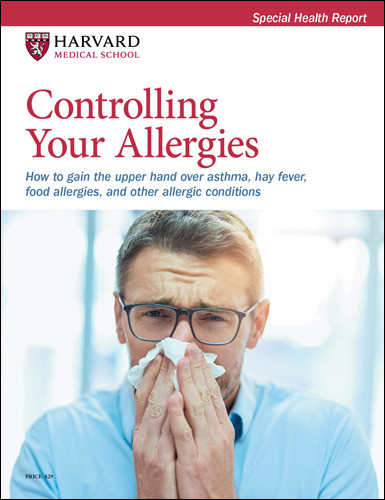Fall allergen alert

It's not just weed pollen causing allergy symptoms; mold is also potent during autumn months.
There's more in the autumn air than just falling leaves. Ragweed pollen, mold, and other allergens are especially common at this time of year. The fall allergy season is usually the result of pollen from weeds. But after the first frost, it's much more about mold.
Allergens
The predominant allergen in the fall is ragweed, which grows abundantly throughout the South, North, and Midwest. It has lightweight pollen with grains that can travel on the wind for hundreds of miles. Other weed allergens include tumbleweed, curly dock, lamb's-quarter, pigweed, sheep sorrel, and sagebrush.
Outdoor molds are another cause of fall allergies. They are in soil, com-post piles, and leaves. Mold spores are common after the ragweed season. They are light, very small, and easily inhaled into the lungs. Spring and summer allergies are usually related to pollen from trees and grasses.
How they affect us
For some people, inhaling allergens causes the body to overreact. The immune system mistakes a harmless substance, such as pollen, for an invader. That triggers a chain of events that makes mast cells release histamine. Histamine allows fluid to escape from the capillaries into the tissues. This leads to the classic symptoms of a runny nose and watery eyes, and sneezing. This condition is known as allergic rhinitis, an inflammation of the mucous membranes, and it is often marked by nasal congestion and a sore throat.
Diagnosis and treatment
The symptoms of allergic rhinitis are similar to those of the common cold. That can be confusing, but the hallmark of allergies is clear, watery nasal drainage that lasts for a few weeks, as opposed to more yellow or green mucus for a few days.
If you're not sure what's causing your symptoms, a round of allergy testing might pinpoint the problem. This takes place in a doctor's office with either a blood test or a skin test. The latter involves introducing small amounts of allergens into the skin.
Once you know which allergens are causing your body to react, you can develop a plan with your doctor to manage your symptoms. Treatment can involve over-the-counter or prescription medications, or possibly allergy shots.
Top tips to avoid allergensWhile you can't avoid all allergens, you can reduce your exposure to them. Try some of these steps.
|
Image: demerzel21/Getty Images
Disclaimer:
As a service to our readers, Harvard Health Publishing provides access to our library of archived content. Please note the date of last review or update on all articles.
No content on this site, regardless of date, should ever be used as a substitute for direct medical advice from your doctor or other qualified clinician.
















